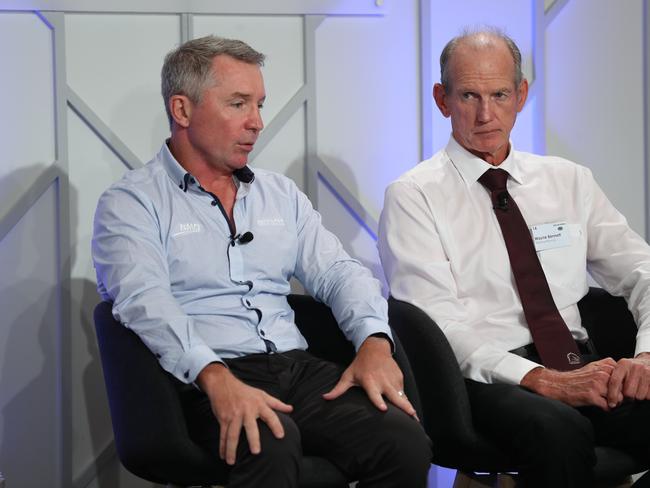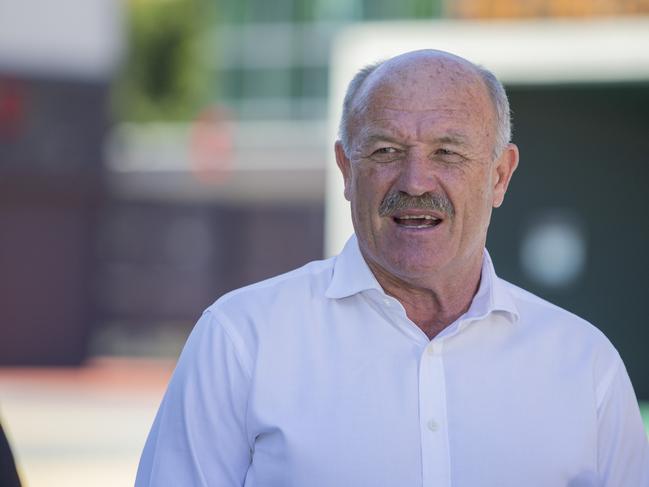Paul Green death tragedy: NRL greats plead with men to speak up about mental health struggles
An emotional Wayne Bennett, who offered Paul Green an assistant coaching job with the Dolphins just three weeks ago to resurrect his NRL career, has issued a heartfelt plea following the rugby league great’s tragic death.
Sport
Don't miss out on the headlines from Sport. Followed categories will be added to My News.
Shattered Queensland rugby league legends have made an impassioned plea to men to open up about their mental health struggles in a desperate bid to prevent more suicide tragedies like that of Paul Green.
In a united appeal in the wake of Green’s shock death, grief-stricken greats of the game Wally Lewis, Wayne Bennett and Kevin Walters called on all men not to be afraid or too proud to speak up.
The powerful plea comes as latest figures reveal that middle-aged men like Green are 50 per cent more likely to take their own lives than all men.
An emotional Bennett, who had offered premiership-winning Green an assistant coaching job with the Dolphins just three weeks ago to resurrect his NRL career, implored other men to talk about their demons so no other families are left heartbroken.
“The challenge for men is to let us know if you’re in that (dark) place,” Bennett said.
“Let us know, because when you open up and talk about your problems, you’ll realise that you’re loved and cared for much more than you give credit for. Talk to someone you trust, but please just talk to someone. Have that conversation.

“Men don’t want to burden us with their problems, and Paul was a man.
“We don’t want to be seen as weak and that’s all men, not just footballers. There are a lot of guys who have done what Paul’s done, unfortunately, and no-one knows about them.
“Men are vulnerable and it’s okay to show that we are. You have to let us know so we can try to help.
“Because this (Green’s death) helps nobody; this hurts us all.”
Maroons icon Wally Lewis said the first step was “often the hardest” when it came to men talking about mental health.
“Among former footballers there was always this gladiator-type role that if they admitted they needed some assistance or were struggling, they saw themselves as being a bit weak,” he said.
“There‘s a lot of steps you can take to address mental health and the first one is often the hardest, that admission that you do need some help or some advice.
“There’s a real opportunity to shine a light on it now and to understand there are people who are professionally trained to deal with this issue.
“It can affect players, fans, even journalists, who might hate to admit that they‘re facing some difficulties.”

A devastated Walters said the NRL needed to do more to provide mental health support for everyone involved in the game.
“It’s important we check on each other each day – particularly with the mental health side of things,” he said.
“It’s something I believe the NRL needs to put more focus on, particularly around our players, coaches and support staff. Everyone that’s involved in the game.
“We need to make sure there’s someone there for you if you want to reach out.”
Australian Rugby League Commission chairman Peter V’landys also made a heartfelt plea for men to speak up if they’re hurting.
“It (Green’s death) just shows you how fragile life is and that we should take care of each other,” he said.
“If there’s a message here is if people self-doubt themselves or have problems, it is a normal human reaction. Speak about it, talk about it.
“We all go through doubting ourselves, we all go through some terrible times but it doesn’t hurt to talk to somebody about it and this is a classic example.
“If anything comes out of this, which is one of the saddest things I’ve been involved in rugby league, it is that people do reach out if they have troubles.”

Sydney Roosters coach Trent Robinson said his players had discussed Green – who played for the club and helped them win the 2013 premiership as an assistant coach – and the need to open up about mental health struggles.
“We spoke (about) that you need to reach out,” Robinson said.
“There’s a need to be open and talk about it more, not hide away what you’re feeling or the help you need.”
Suicide was the tenth leading cause of death in men, according to the most recent Australian Bureau of Statistics data.
According to the ABS data, three quarters of the people who died by suicide in 2020 were men, with those in the 40 to 54 age bracket making up 26.7 per cent of the toll.
Of the 759 suicides in Queensland in 2020, 199 or more than 25 per cent were men aged 40 to 59.
The suicide rate for men increased from 16.2 deaths per 100,000 in 2011 to 18.6 deaths per 100,000 in 2020.
“Men in their 40s and 50s are a high risk (group), being up to 50 per cent more likely to take their own lives than men in general,” said Glen Poole, chief executive of the Australian Men’s Health Forum.
“We’re not doing enough to prevent suicide in men generally. Our research shows that while nearly four in five suicides are men, up to four in five beneficiaries of government-funded suicide prevention services are female.”
Bond University professor and psychotherapist Alan Patching, who has researched mental health in the construction industry and counselled suicidal tradies, said men in “tough culture” industries were much more likely to take their own lives.
“The latest research shows that while more women plan suicide, men are something like three times more likely to actually do it,” he said.
“Most of the guys I spoke with who had attempted suicide or thought about it were middle-aged men.
“Men who work in tough culture industries like construction – and indeed professional rugby league – are part of a culture where they don’t like to look weak. It’s old-school male thinking.”
Prof Patching said “every workplace” should have a dedicated mental health first-aid officer to try to combat the suicide scourge.
He said all workers needed to be alert to suicide danger signs such as colleagues becoming withdrawn or angry, talking about becoming a burden to others or abusing alcohol or drugs.
“One of the big myths is that you shouldn’t talk to people if you think they’re suicidal,” he said.
“We have to create a workplace culture where people know that we’re going to look after them no matter what.”




